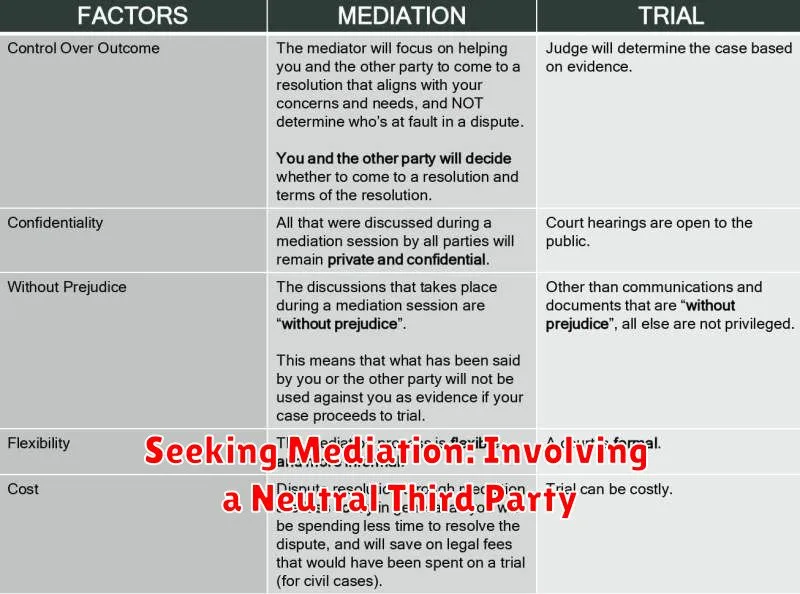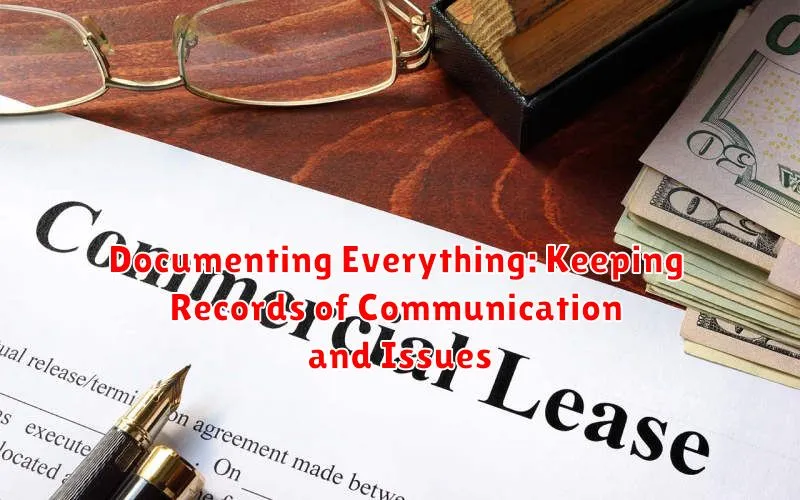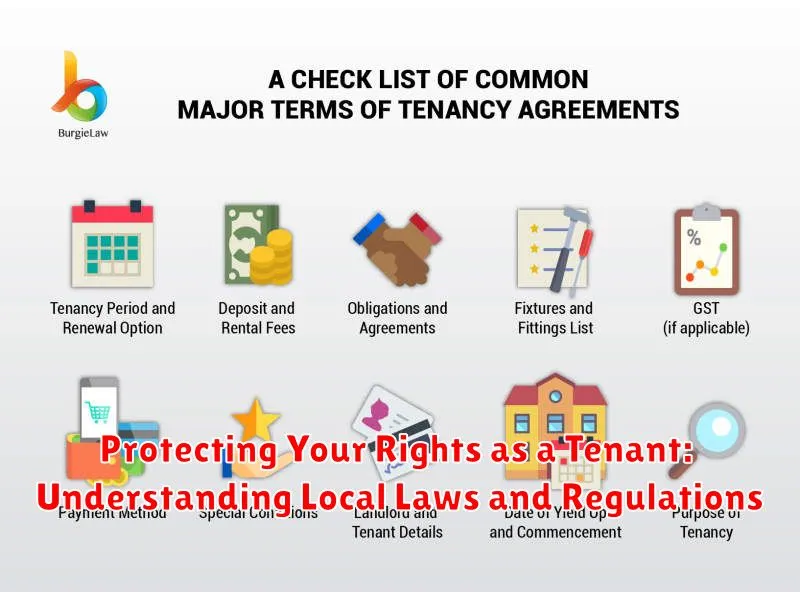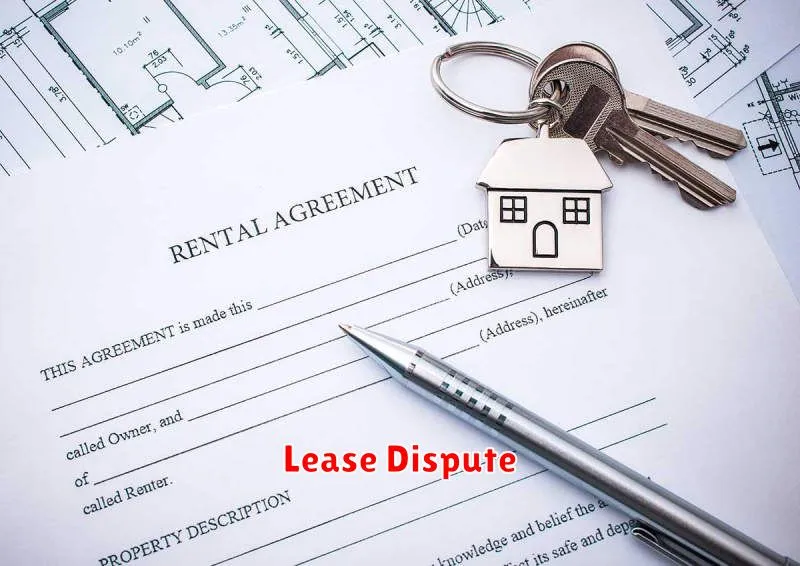Are you facing a lease dispute with your landlord or tenant? Navigating apartment lease disputes can be a stressful and confusing experience. Whether it’s a disagreement about rent payments, repairs, or eviction, understanding your rights and knowing how to resolve the issue effectively is crucial. This comprehensive guide provides essential information and practical tips to help you handle apartment lease disputes effectively and protect your interests.
Understanding Your Lease Agreement: Key Terms and Conditions
Before diving into the specifics of resolving apartment lease disputes, it’s crucial to understand the foundation of your rights and obligations – your lease agreement. This legally binding document outlines the terms of your tenancy, including your responsibilities as a tenant and the landlord’s obligations.
Here are some key terms and conditions you should familiarize yourself with:
- Lease Term: This specifies the duration of your lease, usually a year or month-to-month. Understanding the lease term helps you know when your lease ends and what your options are for renewal or termination.
- Rent Amount and Due Date: This clearly states the rent you are obligated to pay and the date it’s due. Late rent payments can lead to penalties, so ensure you adhere to the payment schedule.
- Security Deposit: This refundable amount protects the landlord against damages to the property. Understanding how the security deposit is handled and the conditions for its return is crucial.
- Pet Policy: If you have pets, be sure to review the pet policy. This section outlines restrictions on types of pets, pet fees, and any other relevant rules.
- Maintenance and Repairs: This section details who is responsible for repairs, the process for reporting issues, and the timeframe for addressing them.
- Quiet Enjoyment: This clause guarantees your right to peaceful enjoyment of the property. Your landlord cannot unreasonably interfere with your privacy or living conditions.
- Termination and Eviction: This section outlines the conditions under which either you or the landlord can terminate the lease and the legal process for eviction.
Familiarizing yourself with these key terms and conditions empowers you to understand your rights and responsibilities, minimizing the chances of disagreements and disputes with your landlord. If you encounter any ambiguities or concerns, it’s always advisable to seek clarification from your landlord or legal counsel.
Common Lease Disputes: Rent Increases, Repairs, and Noise Complaints
Apartment leases are legally binding contracts that outline the rights and responsibilities of both landlords and tenants. While most leases are straightforward, disputes can arise over various issues. Some of the most common lease disputes include rent increases, repairs, and noise complaints.
Rent Increases: Leases typically specify the rent amount and any terms regarding rent increases. Landlords may not raise rent arbitrarily. They must adhere to the lease agreement or applicable state laws. Disputes can arise if the landlord tries to raise rent beyond the terms of the lease or without proper notice.
Repairs: Landlords have a legal responsibility to maintain the property in a safe and habitable condition. This includes addressing necessary repairs. Disputes can occur when landlords fail to make timely repairs or fail to properly address the issue. Tenants have the right to request repairs and, in some cases, can withhold rent if the landlord fails to act.
Noise Complaints: Noise complaints can be a frequent source of conflict in apartment buildings. Leases often contain clauses regarding noise levels and quiet hours. Disputes can arise if tenants make excessive noise or if neighbors consistently disturb the peace. It’s crucial to communicate with neighbors and try to resolve the issue amicably.
When facing a lease dispute, it’s essential to document everything: communication, requests, and attempts to resolve the issue. If the dispute remains unresolved, consider seeking legal advice or mediation to protect your rights.
Communicating with Your Landlord: Addressing Concerns Effectively
Open and respectful communication is key when dealing with any lease-related concerns. This helps prevent misunderstandings and facilitates finding a solution that works for both parties. Here’s a breakdown of how to effectively communicate with your landlord:
Choose the Right Communication Method: Consider the nature of your concern. For minor issues, like a leaky faucet, a simple phone call or text might suffice. For more complex issues like repairs or rent disputes, it’s best to send a formal written notice via email or certified mail. This creates a written record of your communication and ensures your landlord is aware of the issue.
Be Clear and Concise: State your concern in a clear, concise, and professional manner. Avoid using accusatory language and stick to the facts. Include specific details about the issue, such as dates, times, and any supporting documentation. This helps your landlord understand the situation and respond appropriately.
Be Patient and Understanding: Landlords have a lot on their plates, so be patient and understanding. While you may be frustrated, remember that your landlord likely wants to resolve the issue as well. Give them a reasonable time to respond and be prepared to work together towards a solution.
Keep a Record: Document all communication with your landlord, including the date, time, communication method, and the content of the conversation. This creates a paper trail in case you need to escalate the issue further.
By following these tips, you can effectively communicate your concerns to your landlord and foster a positive and productive relationship. This can lead to a quicker and smoother resolution to any lease disputes.
Negotiating a Resolution: Finding Common Ground with Your Landlord
When a lease dispute arises, it’s essential to remember that both you and your landlord have a stake in finding a resolution. Instead of escalating the conflict, try approaching the situation as an opportunity to find common ground. Open communication and a willingness to compromise are key to reaching a mutually beneficial outcome.
Start by understanding the core issue. What is the root cause of the dispute? Is it a disagreement about repairs, rent payment, or something else entirely? Clearly articulate your concerns and listen attentively to your landlord’s perspective.
Seek a solution that addresses both your needs and the landlord’s. This might involve finding a compromise, making concessions, or brainstorming creative solutions. Consider factors like:
- Fairness: Is the proposed solution equitable for both parties?
- Practicality: Is it feasible to implement?
- Long-Term Impact: Will it create lasting peace or simply mask a deeper problem?
Document everything in writing. Keep a record of all communications, agreements, and compromises. This will help prevent misunderstandings and provide evidence if the dispute escalates further.
Engage a mediator if necessary. If you’re unable to reach an agreement on your own, consider involving a neutral third party like a mediator. A mediator can help facilitate communication, identify potential solutions, and guide you towards a mutually agreeable outcome.
Remember, open and honest communication, a willingness to compromise, and a focus on finding mutually beneficial solutions are all crucial when navigating lease disputes. By approaching the situation collaboratively, you can improve the chances of reaching a fair and lasting resolution.
Seeking Mediation: Involving a Neutral Third Party

If direct communication with your landlord hasn’t yielded results, mediation can be a valuable next step. Involving a neutral third party, like a professional mediator, can create a structured and impartial environment to facilitate a resolution. Mediators are trained to guide the conversation, help both sides understand each other’s perspectives, and explore potential compromises.
Mediation offers several benefits:
- Cost-effective: Mediation is generally less expensive than litigation.
- Less adversarial: It creates a collaborative atmosphere, fostering a more amicable solution.
- Confidentiality: Discussions are typically confidential, promoting open dialogue.
- Flexibility: Mediators can tailor the process to the specific needs of the dispute.
If you decide to pursue mediation, it’s essential to find a qualified and impartial mediator with experience in landlord-tenant issues. Many communities have resources available to connect you with qualified mediators.
Legal Options for Lease Disputes: Consulting with an Attorney
If you’re facing a lease dispute with your landlord, it’s important to know your legal options. While you might be able to resolve the issue on your own through communication and negotiation, sometimes it’s necessary to consult with an attorney. Here’s why:
Legal Expertise: A lawyer specializing in landlord-tenant law understands the intricacies of lease agreements, local ordinances, and state laws. They can help you decipher legal jargon, interpret your rights and responsibilities, and navigate the complex legal system.
Negotiation Skills: Attorneys are skilled negotiators who can advocate for your interests and reach a fair resolution. They can communicate with your landlord on your behalf and help you understand your bargaining power.
Litigation: If negotiation fails, an attorney can represent you in court. This can involve filing a lawsuit or defending yourself against a landlord’s claims.
Preventive Measures: Consulting with an attorney before signing a lease can help you avoid potential disputes in the future. A lawyer can review the lease agreement and ensure it protects your rights.
Peace of Mind: Having an attorney by your side can provide peace of mind during a stressful situation. They can guide you through the process, answer your questions, and represent your interests throughout the dispute.
When to Consult an Attorney:
- If you’re facing a serious lease violation, such as failure to provide essential services, harassment, or wrongful eviction.
- If you’re struggling to negotiate a settlement with your landlord.
- If you’re considering taking legal action against your landlord.
- If you’re unsure of your rights and responsibilities as a tenant.
Consulting with an attorney can be a valuable investment in protecting your rights and achieving a positive outcome in a lease dispute. It’s crucial to act quickly and seek legal advice if you’re facing a difficult situation with your landlord.
Documenting Everything: Keeping Records of Communication and Issues

Keeping detailed records of all communication and issues is crucial in handling apartment lease disputes. This documentation serves as evidence to support your claims and can be vital in resolving conflicts amicably or during legal proceedings. Here’s how to effectively document:
Communication:
- Save all emails, texts, and letters: This includes both correspondence with your landlord and any communication with other tenants or property management staff.
- Document phone calls: Note the date, time, and content of phone calls. If possible, keep a record of the other party’s name and any details of the conversation.
- Use a consistent format: Maintain a system for organizing communication records. A dedicated email folder, a log book, or a spreadsheet can be helpful.
Issues:
- Report all issues promptly and in writing: Use a formal email or letter to document issues like maintenance requests, property damage, or violations of the lease agreement. Include specific details, photos or videos if possible, and a request for a resolution.
- Keep a log of all repairs or maintenance requests: Note the date, time, nature of the request, and the response from the landlord.
- Record the landlord’s response: If the landlord fails to respond or address the issue adequately, document the response or lack thereof.
Tips for Effective Documentation:
- Be accurate and objective: Avoid emotional language and focus on presenting facts.
- Be consistent: Maintain a consistent format and level of detail throughout your documentation.
- Store records safely: Use a secure system for storing documentation to prevent loss or damage.
By diligently documenting all communication and issues, you create a strong foundation for resolving disputes effectively. Remember, clear evidence is essential in protecting your rights and ensuring a fair outcome.
Protecting Your Rights as a Tenant: Understanding Local Laws and Regulations

Before engaging in any lease dispute, it’s crucial to understand your rights as a tenant under local laws and regulations. Every jurisdiction has specific rules governing landlord-tenant relationships, including lease agreements, rent payments, maintenance responsibilities, and eviction procedures. Familiarizing yourself with these regulations is essential for protecting your rights and ensuring a fair resolution.
Start by consulting your local housing authority, tenants’ rights organization, or legal aid services. These resources can provide information on relevant laws and regulations, as well as guidance on your specific situation. Additionally, reviewing your lease agreement thoroughly is essential. It outlines the terms of your tenancy and may contain clauses that affect your rights.
Understanding local laws and regulations empowers you to effectively communicate with your landlord and advocate for your rights during a lease dispute. By knowing your legal standing, you can approach the situation with confidence and clarity, increasing your chances of achieving a favorable outcome.
Avoiding Future Disputes: Maintaining a Positive Landlord-Tenant Relationship
A strong landlord-tenant relationship is essential for a harmonious living experience. Open communication and mutual respect are key to preventing disputes and ensuring a smooth tenancy. It’s important to remember that both landlords and tenants have responsibilities and rights, and understanding these can help foster a positive relationship.
Regular communication is key. Both parties should communicate promptly and effectively about any concerns or issues that arise. This might include things like repairs, maintenance requests, or changes to the lease agreement. Keep a record of all communication, including emails, texts, and phone calls.
Respecting the lease agreement is essential. Read the lease carefully and make sure you understand all the terms and conditions. This includes understanding the rent payment schedule, pet policies, and other rules and regulations. Both parties should abide by the terms of the lease.
Maintaining a good living environment is also crucial. Keep the property clean and in good condition. Address any damage promptly and communicate with your landlord about any potential issues. This will help ensure a safe and enjoyable living environment for everyone.
Being respectful of each other’s time and boundaries is key to maintaining a positive relationship. Avoid contacting the landlord about minor issues that can easily be addressed on your own. Similarly, landlords should avoid unnecessary interruptions to the tenant’s privacy.
By following these tips, both landlords and tenants can contribute to a positive and productive relationship. A strong relationship can help resolve issues quickly and fairly, ultimately creating a more enjoyable experience for everyone.

